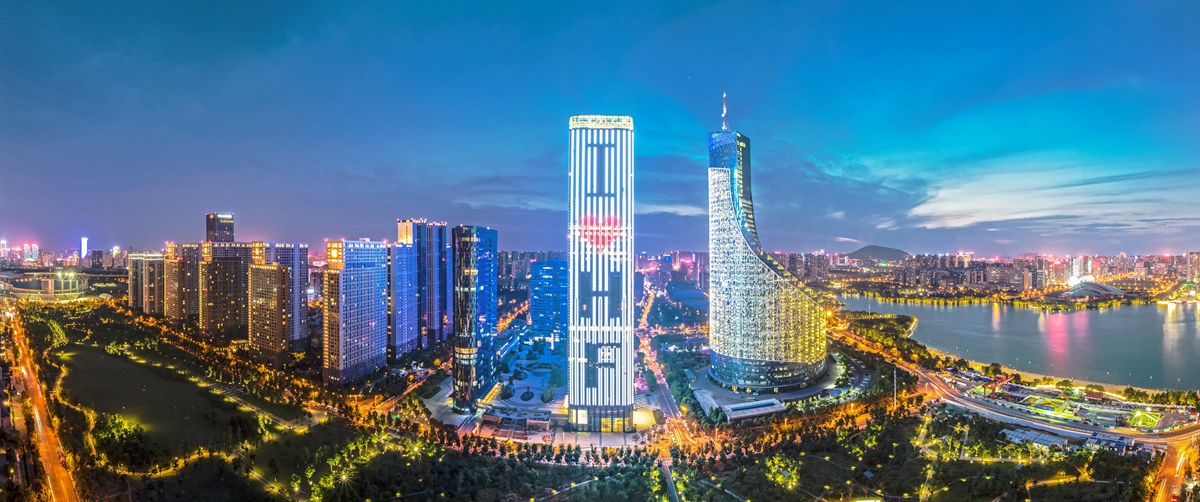Hefei one of foreigners' favorite cities in China

A night view of Shushan district in Hefei, capital of Anhui province. PHOTO PROVIDED TO CHINA DAILY
Academic atmosphere, opportunities in high-tech industries cited as reasons
If people wonder which Chinese cities are the most attractive to foreigners, the results of an annual poll by the State Administration of Foreign Experts Affairs offer some valuable insight.
The administration started to release results after surveying thousands of expatriates living in China over the course of several months in 2019. For two consecutive years, Hefei, capital of East China's Anhui province, was listed among the Top 10 cities.
To spread the word about Hefei, Mohamed Noureldin from Egypt is thinking about making some interactive social media programs.
He first came to Hefei to work as a language teacher 14 years ago."Then I got to love the city and wanted to stay," he said.
"I knew that the University of Science and Technology of China, one of the best universities in the country, is based here, so I decided to try furthering my studies."
Seven years ago, he entered USTC as a postgraduate. He remained a student until last year when he got his PhD in public affairs administration and is now part of a visiting scholars program.
Noureldin believes that Hefei offers a very good academic atmosphere. "I want to do more research and apply what I have learned during my stay at USTC. It's a good opportunity to be at such a prestigious university," he said.
"Also, COVID-19 control in China is safe and stable, but it's horrible outside," he added.
Pursuing an academic career is also the main reason that has kept Ammar Hawbani in Hefei for 16 years.
Attracted by USTC's renown, the Yemeni came to study information science and technology at the university in 2005, after he passed college entrance examinations in his home country with very high marks.
Now an associate professor of wireless network technology, Hawbani said he enjoyed being at the university so much that he chose to stay for his master's and PhD degrees in 2009.
He said that through his observations of students, many young Chinese people exhibit innovative and productive traits.
"Many of my Chinese classmates started their own businesses here, as the city's robust high-tech industries have been offering them more and more opportunities," said Hawbani, who is 36 and the father of a boy born in Hefei.
Cho Sung-hye, who is from the Republic of Korea, said: "We didn't expect that we would come to love Hefei as much as we do."
A fluent Mandarin speaker, Cho has been living in the city with her family for 25 years. For most of that period, she has been teaching Korean at Hefei University. Now, she chairs a Hefei-based company dedicated to promoting cultural exchanges between the two countries.
Cho and her husband, who have two sons, came to Hefei to fulfill their elder son's dream.
"When he was in the third year at middle school, his history teacher, who had some experience in China, suggested to students that they go and live there and see the old country," Cho said.
The boy-a great fan of Chinese history who is able to name more than 900 figures from the Chinese classic, the Romance of the Three Kingdoms-was inspired and wanted very much to follow his teacher's suggestion.
Due to its location, Hefei has connections to many stories from the Three Kingdoms period (222-280).
"My son also wanted to explore the inland areas of China more," said Cho, whose children both attended college in the nation.
"On our first visit to Hefei, I found it was not very developed but thought it had great potential," she said, adding that later, her prediction turned out to be right.
Cho felt the rapidly developing city offered many opportunities to foreigners and persuaded more of her relatives to come.
"At the peak, I had 21 relatives living here. Now, there are roughly 800 people from the South Korea in Hefei, and before the COVID-19 pandemic there were many more," she said, adding that most of her countrymen work in the city's high-tech industries, such as the integrated circuit sector.
Impressed by how the history teacher had influenced her son, Cho has encouraged Chinese students to go to South Korea. She has helped more than 3,000 students from Anhui study in her country, and more than 1,000 later found job opportunities there. She has also brought even more students from South Korea to China.
In 2002, she became the first person from her country to receive China's Friendship Award, the highest honor given to foreigners by the central government. In 2006, she also became the first South Korean citizen to gain permanent residency in China, and in 2010, she was listed as one of the most influential women of the century in Hefei.



